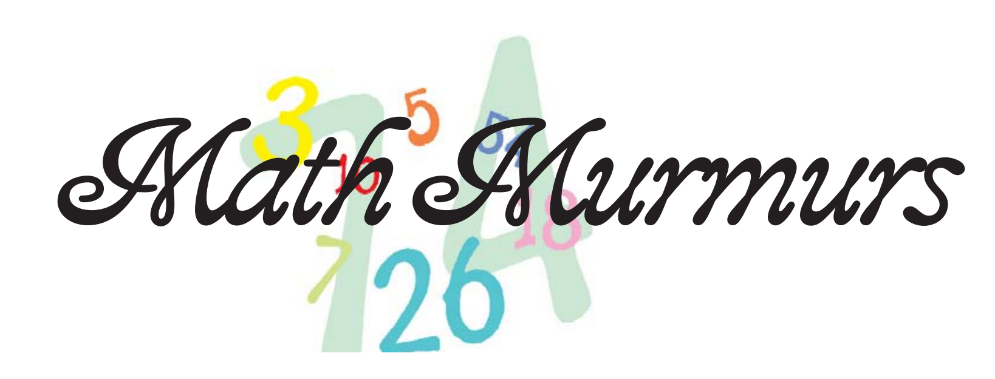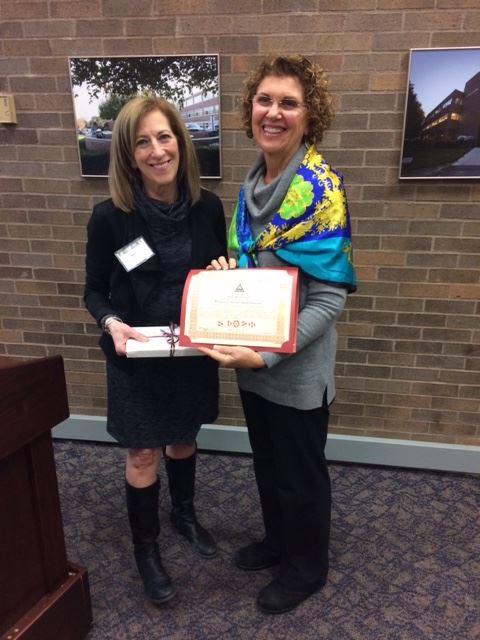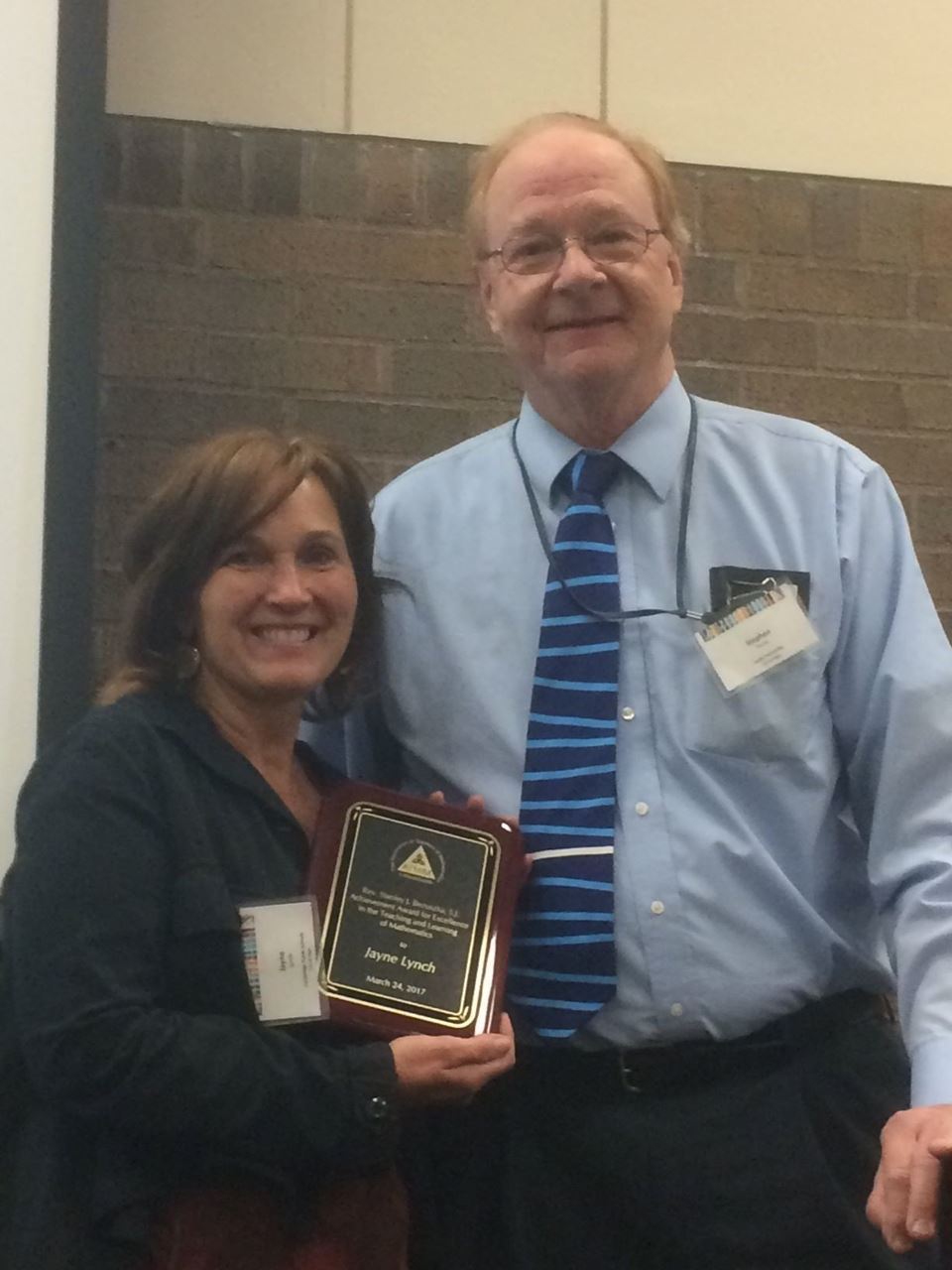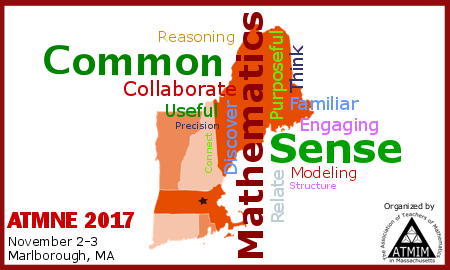
April 2017 Edition
ATMIM Spring Conference 2017 Recap
Submitted by Sandy Ollerhead
The ATMIM Spring Conference was held on Friday, March 24th at Worcester State University. The conference began with the introduction of Dr. Mary Sullivan, Margaret J. Kenney Award Presenter. During her presentation, “Take a Risk: Be Square in Your Math Classroom” participants worked on problems and puzzles involving looking at squares from a multitude of different perspectives. Dr. Sullivan’s topic was specifically chosen to pay tribute to Peg Kenney whom she considered a mentor and friend.
Throughout the day, conference participants had the opportunity to attend a total of 3 one hour sessions, choosing from 8 different workshops during each session. Workshops were on a variety of topics and spanned all grade levels... Continue reading.
![]() Click to read all the tweets from ATMIM's Spring Conference!
Click to read all the tweets from ATMIM's Spring Conference!
Dr. Mary M. Sullivan Presents at Spring Conference in Memory of Peg Kenney
Submitted by Joan Martin

Dr. Mary M. Sullivan, the first Margaret J. Kenney Presentation Awardee, presented “Take a risk: Be square in your math classroom!” at our Spring Conference. Mary masterfully incorporated number theory, geometry, and discrete mathematics, the three topics of particular interest to Peg Kenney, within problems involving squares.
Latin squares, magic squares, dissecting squares, Tic-Tac-Toe, and checkerboards were infused with twists and problem-prompts to investigate. Mary introduced many of us to the electronic games of 100! and 1010! and reintroduced us to some of Lewis Carroll’s and Lagrange’s conjectures... Continue reading.
Jayne Lynch – 2017 Recipient of the Father B Award
Submitted by Steven Rattendi
Annually at the Spring Conference, ATMIM honors a teacher nominated by educators in mathematics to received the Rev. Stanley J. Bezuszka, S.J. Achievement Award for Mathematics Teaching and Learning. This award honors an outstanding mathematics educator that has made contributions to the mathematics community in Massachusetts including through active participation in ATMIM.
Steve Yurek presented this year’s award to Jane Lynch. Jane was truly surprised to receive this award, and caused a slight delay in the Spring Conference Program when she needed to be brought back into the conference hall to hear the announcement of receiving the award.... Continue reading.
Using EBA (Evidence Based Argumentation) to teach Mathematics as a pedagogical instructional resource
Submitted by Filiberto Santiago-Lizardi
Presently, BPS provides thorough coordinated professional development program training for all teachers to employ debate as a pedagogical tool in their classrooms across all academic disciplines. My school got on board three years ago and made EBA a school-wide focus, providing professional development, analyzing assessment and looking at student-work data, and conducting peer observations. All teachers of mathematics at my school, the James P. Timilty Middle School, participated in the training to use evidence-based-argumentation to teach the curriculum and content that they were already planning to teach. Once you begin to understand how to implement it, teachers of mathematics began to realize the potential for debate in their classroom. We all received the opportunity to earn graduate credit through a yearlong professional development training where I learned, created, and tested teaching and learning pedagogical opportunities to engage students in solving math problems using evidence-based-argumentation. Mathematics through argumentation activities engages students in pedagogically sound learning. These opportunities require the use of higher-order thinking skills and learning strategies as our curriculum, assessments, technology, and instructional resources continue to morph, mirroring common core mathematics state standards... Continue reading.
Check out Nrich for Exciting Problems!
Submitted by Susan Weiss
Nrich is a great site that has plenty of activities that encourage children to think. The site is just one of the pieces that make up the Millennium Mathematics Project from the University of Cambridge. There are games, problems, and articles geared towards four grade groupings that represent the lower and upper primary grades and the lower and upper secondary grades.
Below is an example problem from the Being a Good Thinker - Upper Primary collection. The collection is broken into four important mathematical habits: curiosity, thoughtfulness, collaboration, and determination. This puzzle specifically is from “Being Determined.” In Nrich’s own words:
“Here are some problems that may require some determination. The solutions may not be immediately obvious, so you will need to persevere. Success can be sweeter after a struggle!”
ATMIM Blogger of the Month: Stephanie Iacadoro of Writing in the Language of Mathematics
Submitted by Cole Gailus
Name: Stephanie Iacadoro
Twitter Handle: @mathiacadoro
District: Duxbury Public Schools
Position: Mathematics Curriculum Supervisor
Reason for blogging: I thoroughly enjoy writing and needed a spot to unload my ideas
Featured Post: "5 Ways to Break the Cycle of Repetitive Math Homework"
"I've been thinking a lot on alternative ways to assign students homework in Math class. Out of habit, we tend to assign students practice problems, go over the answers at the beginning of class, and then jump into another concept. We create this routine in Mathematics class that can sometimes prevent deeper thinking. This has become such a routine that our students expect the worksheet, expect the answer key, and expect to have their teacher rehearse those practice problems in class the next day.
How do we break this cycle? We start assigning homework differently.
To begin, I am an advocate for student choice and voice. I do not believe that students can grow as learners without giving them an opportunity to discover how they learn best and demonstrate their understanding in their own way." Continue reading at Writing in the Language of Mathematics.
Do you want to see your blog featured here? Let us know at atmim.murmurs@gmail.com!
Local Professional Development Opportunities
Submitted by Cole Gailus
A PD Opportunity for Grades 6-8 Math Teachers with English Learner Students
Visual Access to Mathematics (VAM) is a free professional development course offered by Education Development Center (EDC) to middle grades mathematics teachers, coaches, and EL teachers in Massachusetts as part of a National Science Foundation funded project. Through a combination of face-to-face workshops (at EDC in Waltham) and interactive online course sessions, participants learn about the use of visual representations and language support strategies in the context of ratio and proportion math content. PDPs (at no cost) or graduate credit (for a fee) are available to participants. To learn more, contact Jessica Brett (jbrett@edc.org) or fill out this interest form (go.edc.org/vam-form) as soon as possible, before enrollment closes. Additional information can be found at: go.edc.org/vam
National Math Coaching Conference: Making the “Cultural Shift” to Math Coaching in Maine
The University of Maine at Farmington will be hosting the National Math Coaching Conference on Thursday, June 1, 2017. The Keynote Speaker is Antonia Cameron, Co-author of Agents of Change: How Content Coaching Transforms Teaching and Learning. Click here to learn more about this great opportunity!
Problem of the Month - Three Men, One Monkey, and Many Mangoes
Submitted by John Bookston
Three men (Jawaharlal, Ravi, and Sunil) spent an entire day picking mangoes. They had decided that they would each take an equal share of the mangoes when they were done, but at the end of the day, they were too tired to divide them up. So they all went to sleep.
In the middle of the night, Jawaharlal woke up and decided to take his share. He counted the mangoes and saw that there was one too many to divide evenly by three. So he fed that one to a monkey, took his 1/3 share, and went back to sleep.
Shortly after, Ravi awoke and decided to take his share. Of course, he had no idea that Jawaharlal had already done this. Ravi counted the mangoes and saw that there was one too many to divide evenly by three. So he fed that one to the monkey, took his 1/3 share, and went back to sleep.
Not too long after this, Sunil woke up. He thought, "I think I will take my share now." Even now, Sunil was unaware of his friends' actions. He counted the mangoes and saw that there was one too many to divide evenly by three. So he fed that one to the monkey, took his 1/3 share, and went back to sleep. Continue reading to see what happens next!
Share your news!
Has something exciting happened recently in your professional life? Are you planning an event or leading a PD session at your school? Have you published an article or book? Are you trying something new in your classroom? Let us know so we can share your news with the Massachusetts math educator community!
Important Dates
March 10, 2017:
Applications for Student Scholarships due
March 24, 2017:
ATMIM Spring Conference, Taking Risks in the New Frontier: Rigor, Reasoning, and Relevance
July 9-12, 2017:
Second New3 Math Conference at Siena College in New York
November 2-3, 2017:
ATMNE 2017, Common Sense Mathematics in Marlboro, MA
